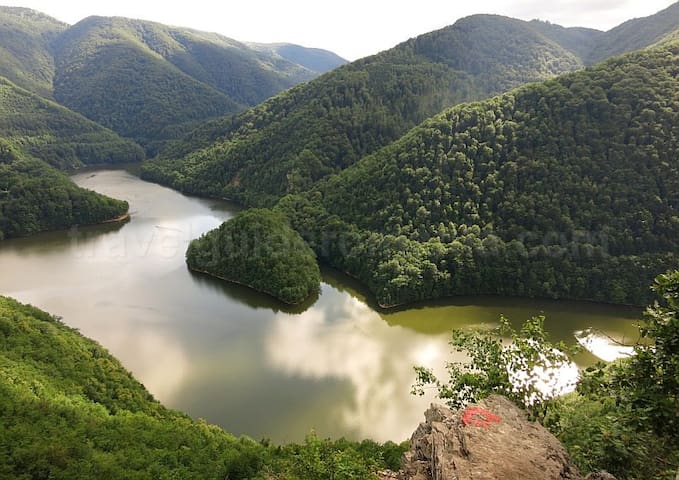Sightseeing
Turda Salt mine is one of the main tourist attractions of Transylvania, representing a real salt mining museum, being a modern recreation facility and, at the same time, a treatment facility.
86 helybéli ajánlásával
Salina Turda
7 Aleea DurgăuluiTurda Salt mine is one of the main tourist attractions of Transylvania, representing a real salt mining museum, being a modern recreation facility and, at the same time, a treatment facility.
The Turda Gorge was formed as a result of limestone erosion during the Jurassic period, having a length of approximately 2 km and a vertical expansion of almost 200 meters. The area has a very large variety of karst landforms and a flora comprising over 1000 species.
51 helybéli ajánlásával
Cheile Turzii
Cheile TurziiThe Turda Gorge was formed as a result of limestone erosion during the Jurassic period, having a length of approximately 2 km and a vertical expansion of almost 200 meters. The area has a very large variety of karst landforms and a flora comprising over 1000 species.
Tarnita Lake is an accumulation lake, with an area of over 200 hectares. Sports associations are periodically organizing various swimming of fishing contests here.
22 helybéli ajánlásával
Lake Tarnița
Tarnita Lake is an accumulation lake, with an area of over 200 hectares. Sports associations are periodically organizing various swimming of fishing contests here.
The Bánffy Castle of Bontida is one of the architectural monuments representative for the Transylvanian Baroque, being also known as the "Transylvanian Versailles" for its abundance of elements specific for this architectural style.
14 helybéli ajánlásával
Bánffy Castle
DJ161The Bánffy Castle of Bontida is one of the architectural monuments representative for the Transylvanian Baroque, being also known as the "Transylvanian Versailles" for its abundance of elements specific for this architectural style.
The Botanical Garden of Cluj-Napoca occupies an area of 14 hectares, having various collections of plants counting approximately 10.000 species. Inside the Botanica Garden we can also find the Botanical Institute, the Botanical Museum and the University Herbarium, which hosts 655.000 sheets of herbarium with plants from all over the world.
118 helybéli ajánlásával
Botanical Garden
15 Strada Alexandru BorzaThe Botanical Garden of Cluj-Napoca occupies an area of 14 hectares, having various collections of plants counting approximately 10.000 species. Inside the Botanica Garden we can also find the Botanical Institute, the Botanical Museum and the University Herbarium, which hosts 655.000 sheets of herbarium with plants from all over the world.
"Saint Michael" Church, which dominates one of the central squares of the city - Unirii Square - is an important Gothic style building erected in Transylvania. One of the most important decorations of the church, the sacristy door case, dates from 1528 and is made in the style Late Renaissance.
50 helybéli ajánlásával
Szent Mihály-templom
Piața Unirii"Saint Michael" Church, which dominates one of the central squares of the city - Unirii Square - is an important Gothic style building erected in Transylvania. One of the most important decorations of the church, the sacristy door case, dates from 1528 and is made in the style Late Renaissance.
The Central Park, publicly called the Grand Park, is opened since 1830. The Casino building and the lake are the main attractions and everyone stepping over its doorstep can enjoy the various recreational possibilities it offers.
130 helybéli ajánlásával
Simon Barnukiu Központi Park
The Central Park, publicly called the Grand Park, is opened since 1830. The Casino building and the lake are the main attractions and everyone stepping over its doorstep can enjoy the various recreational possibilities it offers.
The Cetățuia (Fortress) Park is the place with the most beautiful panorama of Cluj-Napoca and an important belvedere tourist point. Located at an altitude of 405 meters, it has a platform-like aspect on which the first Vauban-type fortification in Transylvania was built by the Hapsburgs in the 18th century.
152 helybéli ajánlásával
Cetățuia Park
60a Strada Emil RacovițăThe Cetățuia (Fortress) Park is the place with the most beautiful panorama of Cluj-Napoca and an important belvedere tourist point. Located at an altitude of 405 meters, it has a platform-like aspect on which the first Vauban-type fortification in Transylvania was built by the Hapsburgs in the 18th century.
Cluj Arena Stadium was inaugurated in 2011 and is classified as an UEFA Elite stadium, having a capacity of approximately 30.000 seats.
28 helybéli ajánlásával
Cluj Arena
2 Aleea StadionuluiCluj Arena Stadium was inaugurated in 2011 and is classified as an UEFA Elite stadium, having a capacity of approximately 30.000 seats.
With a total area of 38.410 square meters and a capacity of up to 10.000 seats, the BT Arena is hosting sports events, cultural and corporate events, as well as conferences, concerts, job fairs, university fairs and vacation fairs. It is developed on 5 levels, having a video cube unique in the country, with four large size screens displaying full HD images.
Polyvalent Hall
Strada Uzinei ElectriceWith a total area of 38.410 square meters and a capacity of up to 10.000 seats, the BT Arena is hosting sports events, cultural and corporate events, as well as conferences, concerts, job fairs, university fairs and vacation fairs. It is developed on 5 levels, having a video cube unique in the country, with four large size screens displaying full HD images.
The valuable heritage of the Museum includes over 450.000 objects illustrating the Transylvanian history and civilisation from prehistoric ages until our times.
29 helybéli ajánlásával
Erdélyi Történeti Nemzeti Múzeum
2 Strada Constantin DaicoviciuThe valuable heritage of the Museum includes over 450.000 objects illustrating the Transylvanian history and civilisation from prehistoric ages until our times.

